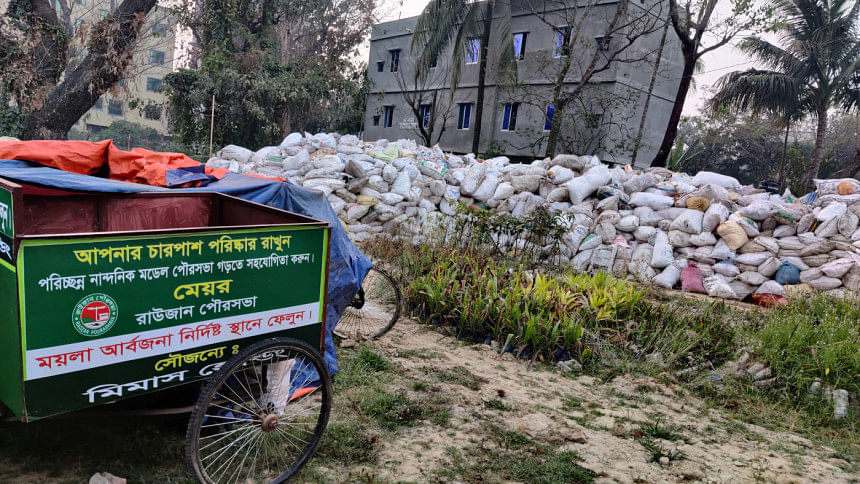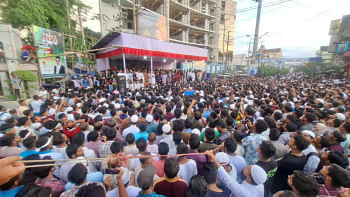A town with no plastic bottles or polythene bags

Recently, while visiting a small town in the south called Raozan, I was impressed to see how there were no empty plastic bottles or used polythene lying around. Thanks to the initiatives of the municipality mayor and the local MP, the town has been rid of any public display of polluting material. With a total population of about 80,000, it is a clean, relatively calm town—a feast for the eyes for anyone visiting from outside.
The municipality council headed by the mayor has been supervising the collection of used plastic materials for the last one year. The mayor, twice a week, encourages the collection by providing cash incentives for anyone bringing these non-degradable materials to the municipality premises. I was present at one of these occasions when about a hundred people gathered on the premises, bringing about 300 sacks of plastic materials. The mayor paid Tk 200 per sack. He is trying to get Raozan officially recognised as the most environmentally friendly town in the country. With thousands of sacks now piled up near the municipality office, which from a distance looks like a small mountain, the next goal is to use them in a plastic recycling plant which the mayor is reportedly going to establish soon.
In addition to this, the mayor and the councillors, the MP and the upazila chairman regularly interact with local people to raise awareness of the environmental consequences of polythene and plastic materials. They're mobilising the students, local administration, boy scouts and girl guides to keep not just the municipality area but the entire upazila clean. Local leaders have also encouraged people to plant about two million trees in recent years. All the roads in the upazila are lined up with trees planted by local people. The tree plantation campaign is a regular phenomenon here, its message being—"Clean and Green Raozan".
Public representatives have also been campaigning against illicit drug use and other social evils with remarkable success. Once a hotbed of crime, the upazila is now a peaceful place to live. Local businesses and private enterprises are encouraged by the overall improvement in the law and order situation in the upazila. It is also a food-surplus area. The importance of social harmony and communal peace in unleashing productive forces is clearly demonstrated by these positive efforts. This can be an example for other local governments as well.
Another aspect of Raozan's local leadership is their efforts to encourage small businesses by donating boats, vans, rickshaws and sewing machines to the poor. Local businessmen have also been donating money for building infrastructure in the town. This is keeping the roads and drains in operation. Due to its small size, being an upazila-level municipality, Raozan has a shortage of revenues and receives little government funds. Therefore, private initiative has become crucial for maintaining municipality services, including the cleanliness of roads. A fleet of garbage vans, donated by a local businessman, is seen regularly collecting household waste.
Due to a wide range of economic and business activities, the town attracts people from rural areas, most of whom are poor. With the growth of the population, the demand for public utilities and services has been growing. The poor live in squatters without health, water or drainage facilities (the municipality recently provided houses to one hundred poor families). There is a shortage of roads, street lights, drains, playgrounds, etc. The town has an area of 32 square kilometres and is an "A Class" municipality. The Department of Public Health Engineering is currently building the first water supply network there. So far, people are fully dependent on underground and pond water. The municipality has a total drainage network of only 10.5 km including 8 km of kutcha drain. The combined challenges of domestic water supply, street lights, sewerage, garbage collection and disposal are enormous. Most of the internal roads are narrow and not maintained properly, and the drains are open.
Raozan municipality has prepared a master plan and an urban development plan taking into account land use, drainage and environmental management, traffic and transportation management, and industrial and recreational facilities. These plans are very comprehensive and have been drawn up to build a potentially healthy city. The city still has a large area of agricultural and hilly land which is expected to go towards other uses with the growth of the population and establishment of new houses and businesses in the future. However, the hilly land and water bodies must be preserved at all costs to preserve the city's environmental balance.
If properly developed, there is a good prospect of Raozan growing into an aesthetically beautiful city in the future.
Dr Nawshad Ahmed, a former UN official, is an economist and urban planner.

 For all latest news, follow The Daily Star's Google News channel.
For all latest news, follow The Daily Star's Google News channel. 



Comments